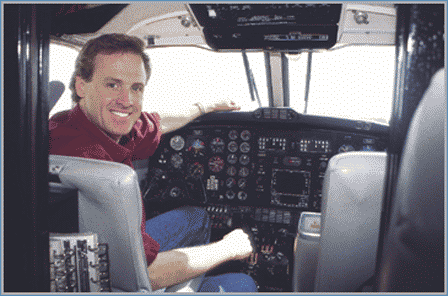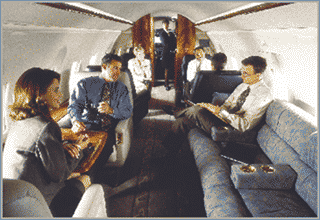
|
By Karsen Palmer Price
Get where you want, when you want, in the off-season by buying a share of a private jet.
|

|

|
Hopping a commercial flight these days is about as relaxing as hitting the mall the day before Christmas. Lines are long, delays are frequent, space is limited. Throw in one colicky baby, and it's enough to convince a person to stay at home next time around. If the experience is annoying for the average person, the aggravation skyrockets for professional athletes. Team charters are bad enough, but at least on those an effort is made to erect a barrier between the traveling athlete and the traveling public. In the off-season, flying solo and commercial, an athlete can be at the mercy of over-zealous fans.
One alternative is to buy ‹ and maintain ‹ a private jet. That, however, is a privilege reserved for only a few, even among the rarefied ranks of professional athletes. Charters are another option, but they can be unreliable and, if used frequently enough, add up to a considerable cost.
The best of all possible worlds just may be "fractional ownership" of jet aircraft, an option that confers all the benefits of jet ownership on companies and individuals but without most of the hassles. Think of a real estate time-share but with one important distinction: Planes are available to fractional owners on demand, not just at specified times.
The leader in fractional aircraft sales is NetJets, a Woodbridge, N.J.-based firm that serves about 65 percent of the market.
|

|
NetJets operates $1.8 billion worth of aircraft and employs more than 600 pilots and has annual revenue in excess of $1 billion. The company's 1,000-plus customer list includes more than 20 professional golfers as well as the world's No. 1-ranked tennis player, Pete Sampras. Dave Clery, manager of NetJets' Miami sales office, says his company entered the market in 1987 based on the assumption that all business airplanes are underused. "The premise is that if they're all underutilized and we could maximize the utilization, we could have multiple owners sharing that maximum utilization," he said.
Dave Clery, manager of NetJets' Miami sales office, says his company entered the market in 1987 based on the assumption that all business airplanes are underused. "The premise is that if they're all underutilized and we could maximize the utilization, we could have multiple owners sharing that maximum utilization," he said.
"Then the rest becomes very complex. We have a backup fleet of aircraft, guaranteed pricing, we own the planes, we pay the pilots, we do all the maintenance, we provide the insurance... It becomes a turn-key sort of thing."
By taking advantage of the economies of scale brought to bear by a firm like NetJets, Clery contends, a consumer can reduce his cost of aircraft ownership by 75 percent.
Two other key players are Dallas Business Jets Solutions, a unit of Canadian aircraft manufacturer Bombardier, and the newest addition to the market, Raytheon Corp.'s Travel Air program, located in Wichita, Kan.
The process of buying interest in a jet is simple, and varies little from company to company. A Travel Air prospect, for instance, is first sent an information packet explaining the program and listing the types of aircraft available. The prospect is then put in contact with the appropriate regional sales manager, and a meeting can be arranged to answer any questions.
|

|

"At that time they can either view one of the aircraft at an airport near them or we can actually schedule a demonstration flight," said Travel Air sales coordinator Cindy Kilgore. "They can (also) come and tour the factory and our corporate facilities here in Wichita."
Next, the buyer must choose the type of aircraft he wants and the amount of interest to purchase. Interest is measured in fractions a one-eighth share is standard ‹ which equate with a specific number of hours per year of use.
At Travel Air, for instance, a one-eighth share in a seven-passenger King Air B200 turbopropthe smallest plane available through the firm ‹ cost $508,000 in 1998 and was good for 100 flying hours. At the other end of the scale, a similar share in one of NetJets' 13-passenger Gulfstream IV S-P jets sold for $3.9 million.
There is no mark-up over retail when buying a fractional interest in a plane, and the shareholder usually enjoys full ownership benefits, including tax deductibility - pro-rated, of course.
In addition to the purchase price, a monthly maintenance fee is assessed, covering the cost of pilots, insurance, storage, maintenance, and so forth. For the same King Air B200, Travel Air's 1998 monthly fee was $6,495. An hourly rate is also charged based on actual flight time. This fee ‹ $725 an hour for the King Air ‹ covers the cost of fuel and oil.
Ownership contracts typically run for five years. At the end of the term, an owner can decide to stay with the same plane and simply renegotiate the operating agreement, trade up (or down) to a different plane, or get out of the program altogether. In this last case, the share is bought back by the company at "fair market value" ‹ anywhere from 79 percent to 88 percent of the original investment, according to Business Jets Solutions sales support analyst Jon Maxfield.
|

|
"So you do recover quite a bit of the cost of your initial investment," he says.
Fractional ownership carries with it the guarantee that a plane will be at the customer's disposal within four to 10 hours of the request. And while you may not always board the actual plane - serial number and all - that you partially own, you will fly in the same model.
Other than pricing, what distinguishes the three competing companies is the type of aircraft flown. "We buy from four different manufacturers," NetJets' Clery says. "Those other two programs are owned by manufacturers of airplanes, and so they only do their type (of aircraft)."
Between the three companies, every type of business jet made is available. There is also a smattering of smaller players, Clery says, who offer a similar service on a very reduced scale with used aircraft.
Karsen Palmer Price is a writer in Charlotte, N.C.
|
|
|
|

|
|

